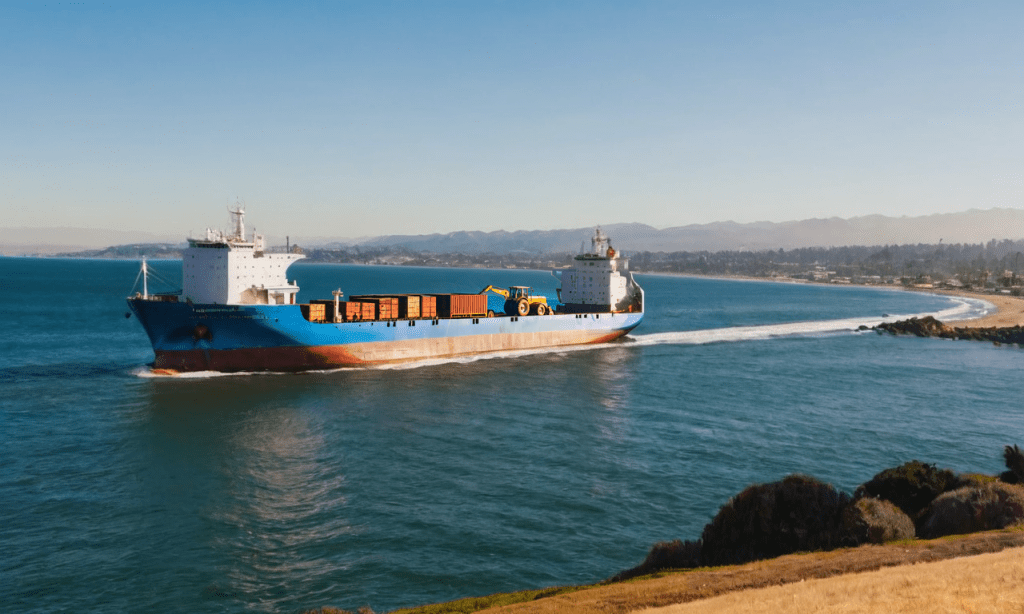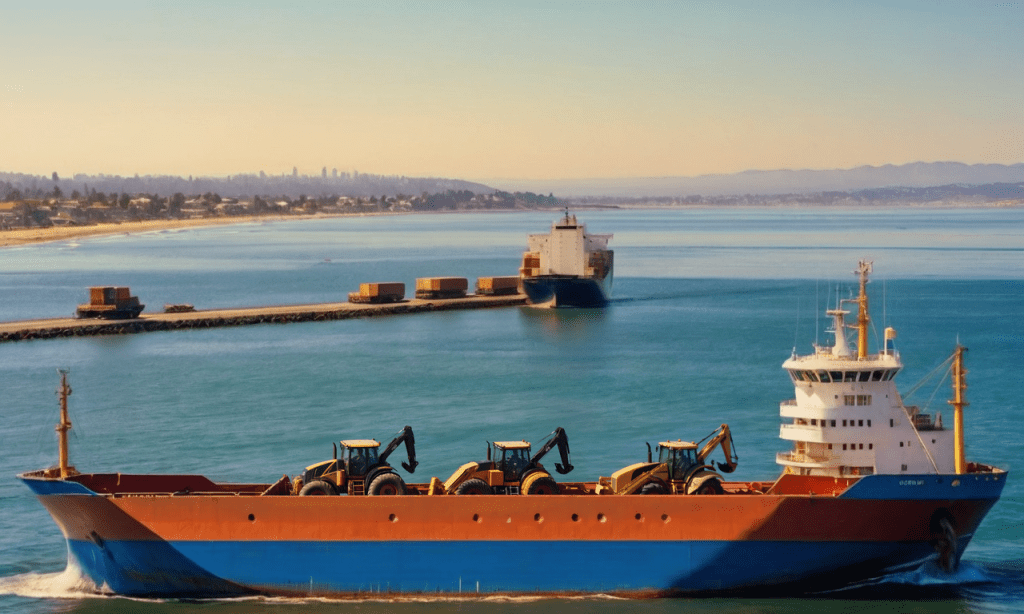
Shipping heavy equipment is a complex and vital aspect of various industries, including construction, mining, agriculture, and manufacturing. The successful transportation of heavy machinery, vehicles, and equipment relies heavily on efficient coordination throughout the entire process. In this article, we will explore the world of coordinating the shipping process for heavy equipment and address the fundamental question, "Who is responsible for coordinating the shipping process of heavy equipment?"
In the following sections, we will explore the roles and responsibilities of each key player in heavy equipment shipping, shedding light on how their collaboration ensures the smooth and secure transit of these substantial assets. Additionally, we will discuss the importance of technology, insurance, and risk management in this context, as well as share real-life case studies and insights into overcoming challenges.
By the end of this article, you will have a comprehensive understanding of the intricate web of responsibilities involved in coordinating the shipping process of heavy equipment. Whether you are a professional in the industry or simply curious about how these massive machines make their journey, this article aims to provide valuable insights and answers to your questions. Let's begin by exploring the role of freight forwarders in this complex logistics puzzle.

Understanding the Key Responsibilities of Freight Forwarders
When it comes to answering the question of who is responsible for coordinating the shipping process of heavy equipment, one of the key players in the supply chain operations is the freight forwarder. Freight forwarders specialize in supply chain management and are experts in orchestrating the logistics of transporting heavy equipment from point A to point B.
A logistics coordinator job within a freight forwarding company is instrumental in ensuring the smooth flow of heavy equipment shipments. The logistics coordinator's role revolves around managing shipping schedules, overseeing inventory records, and coordinating with various stakeholders involved in the process.
The logistics coordinator job description includes responsibilities such as liaising with shippers to understand their requirements, selecting the appropriate carriers for transportation, and ensuring that all necessary permits and documentation are in place. They are the orchestrators who ensure that the heavy equipment reaches its destination on time and in compliance with regulations.
One of the key aspects of the logistics coordinator role is maintaining meticulous inventory records. This includes keeping track of the heavy equipment in transit, monitoring its condition, and providing timely updates to the concerned parties. Effective communication and attention to detail are vital in this role, as any discrepancies or delays can have a significant impact on supply chain operations.
Freight forwarders play a critical role in the coordination of heavy equipment shipping, and their expertise in logistics ensures that the process is efficient and cost-effective. In the next section, we will explore the responsibilities of shippers and consignees in this complex supply chain.
Responsibilities of Shippers and Consignees
In the field of heavy equipment shipping, the responsibilities of shippers and consignees are paramount to the success of the coordination process. Shippers are the ones responsible for preparing the heavy equipment for transportation, while consignees play a critical role in receiving and unloading the equipment at its destination.
Shippers have a demanding role in ensuring that the heavy equipment is adequately prepared for transit. This includes securing the equipment properly, disassembling it if necessary, and ensuring that it meets all safety and regulatory requirements. Proper packaging and documentation are also part of the shipper's responsibilities, as they are necessary for a smooth journey through the supply chain.
Consignees, on the other hand, are responsible for receiving the heavy equipment at the destination and unloading it safely. This involves having the necessary equipment and personnel ready to handle the arrival of the shipment. Coordination between shippers and consignees is important to ensure that the heavy equipment is received without delays or damage.
Effective communication between shippers and consignees is necessary throughout the shipping process. Timely updates regarding the progress of the shipment, any potential delays, and special handling requirements are part of this communication. The successful coordination of responsibilities between these two parties is key to the overall success of heavy equipment shipping operations.
As we delve deeper into the responsibilities of various stakeholders, we will continue to uncover the intricate web of coordination that ensures the safe and efficient transit of heavy equipment. Next, we will explore the carrier's responsibility in this complex supply chain.

Exploring the Accountability of a Carrier
In heavy equipment shipping, carriers hold a pivotal role responsible for the physical transportation of heavy machinery.
Freight carriers are tasked with ensuring the safe and timely delivery of heavy equipment from one location to another.
Their specialization lies in logistics operations related to heavy equipment, including oversized and heavy loads.
Selecting the right carrier is necessary as it directly impacts the efficiency and safety of the transportation process.
Primary Responsibilities of Freight Carriers
Proper Handling
- Freight carriers are responsible for the proper handling and secure transportation of heavy equipment.
- This entails adhering to safety regulations and utilizing appropriate restraints.
- Specialized transportation vehicles are employed when necessary to ensure secure transport.
Inventory Tracking
- Carriers maintain meticulous inventory records during transit to prevent losses or damage.
- Tracking inventory is necessary to account for all items and equipment in the shipment.
Shipping Documents
- Managing shipping documents is a vital aspect of carrier responsibilities.
- These documents encompass permits, licenses, bills of lading, and other paperwork necessary for regulatory compliance and smooth logistics operations.
- Logistics coordinators within the carrier's organization oversee the organization and availability of these critical documents.
Freight carriers' expertise in logistics operations plays a pivotal role in ensuring that heavy equipment reaches its destination without any incidents. In the following section, we will explore the regulatory compliance aspects associated with heavy equipment shipping.
Adhering to Rules and Regulations - The World of Regulatory Compliance
Compliance with regulations is a critical component of coordinating the shipping process of heavy equipment. Oversized and overweight shipments, common in heavy equipment transportation, require strict adherence to federal and state regulations.
Obtaining the necessary permits and licenses for oversized and overweight shipments is the responsibility of logistics coordinators within the shipping organization. These coordinators ensure that all legal requirements are met, preventing potential delays and penalties.
Regulatory compliance extends to safety measures during transportation. Freight carriers must adhere to regulations regarding load securement, vehicle specifications, and driver qualifications. Failure to comply with these regulations can result in accidents, damage to the equipment, and legal consequences.
One of the challenges in heavy equipment shipping is the ever-changing regulatory landscape. Logistics coordinators and freight carriers must stay up-to-date with the latest regulations and ensure that their operations align with the current legal requirements.
In this section, we have explored the importance of regulatory compliance in coordinating the shipping process of heavy equipment. Next, we will check out the role of insurance and risk management in safeguarding shipments.

Technology and Tracking
In today's fast-paced world of heavy equipment shipping coordination, technology plays a pivotal role in enhancing efficiency and transparency. Logistics coordinators, logistics managers, and shipping coordinators rely on a range of technological tools and solutions to streamline the shipping process.
One of the key elements of technology in heavy equipment shipping is logistics software. This software facilitates the management of shipping schedules, tracks inventory, and automates many aspects of logistics operations. It allows logistics coordinators to update inventory records in real-time, providing accurate and up-to-date information.
Logistics software also offers real-time tracking capabilities, enabling logistics managers and shipping coordinators to monitor the progress of shipments. This not only ensures that shipments are on schedule but also allows for quick response in case of unexpected delays or issues.
Maintaining accurate records is critical in heavy equipment shipping coordination, and technology simplifies this task. With the help of advanced software, logistics professionals can efficiently manage inventory records, track equipment movements, and generate detailed reports for analysis.
As technology continues to advance, its role in heavy equipment shipping coordination will only become more significant. The integration of GPS tracking, IoT sensors, and data analytics will further enhance the efficiency and reliability of the shipping process.
Identifying Challenges and Navigating Pitfalls
Effective coordination in heavy equipment shipping is important, but logistics professionals often encounter common challenges and pitfalls that require proactive solutions.
Communication Breakdowns
- Challenge: Potential for miscommunication among various stakeholders, leading to delays and disruptions.
- Solution: Maintain open lines of communication between logistics coordinators, shippers, consignees, and carriers. Ensure everyone is well-informed and aligned.
Unpredictable External Factors
- Challenge: Unforeseeable factors like weather conditions, road closures, or sudden regulatory changes can affect shipments.
- Solution: Prepare contingency plans to adapt to unforeseen circumstances, minimizing the impact on shipping schedules and logistics operations.
Maintaining Equipment Integrity
- Challenge: Despite best efforts, there is always a risk of damage or accidents during transit.
- Solution: Prioritize safety measures, securement practices, and comprehensive insurance coverage to address potential pitfalls.
Effective coordination in heavy equipment shipping demands vigilance and strategic planning to overcome these challenges. Proactive solutions ensure the smooth flow of logistics operations and successful coordination within the complex landscape of heavy equipment shipping.

Conclusion
Orchestrating the seamless transportation of heavy equipment demands a synchronized network of responsibilities to achieve successful outcomes. Key insights from this exploration include:
- Effective Coordination is Paramount: Safeguard the secure and timely delivery of heavy equipment through meticulous coordination.
- Collaboration of Key Stakeholders: Freight forwarders, shippers, consignees, carriers, and logistics professionals play pivotal roles in this intricate process.
- Integration of Compliance, Technology, and Risk Management: Success hinges on the incorporation of regulatory compliance, cutting-edge technology, and robust risk management strategies.
- Undeniable Importance of Coordination: Coordination stands as the linchpin, ensuring heavy equipment reaches its destination without incidents or delays.
Embarking on your own heavy equipment shipping ventures, we urge you to make informed decisions when selecting partners. Opt for professionals with a proven logistics track record, emphasizing open communication and adherence to regulations.
Ready to elevate your heavy equipment shipping experience? Trust A1 Auto Transport, where precision meets efficiency. Connect with us now for reliable and streamlined shipping services. Your commitment to excellence in coordination will undoubtedly lead to successful and efficient heavy equipment shipments. Explore additional articles and tools on our platform for further guidance and resources in the domain of heavy equipment shipping coordination.






 Share on Facebook
Share on Facebook Share on LinkedIn
Share on LinkedIn Share on Twitter
Share on Twitter




 Google
Google  Instagram
Instagram  Trustpilot
Trustpilot 



